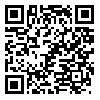BibTeX | RIS | EndNote | Medlars | ProCite | Reference Manager | RefWorks
Send citation to:
URL: http://dsme.hums.ac.ir/article-1-444-en.html
Introduction: Academic self-efficacy refers to the beliefs of studying, doing research activities, asking questions in the classroom and getting good grades. This study was conducted with the aim of investigating academic self-efficacy in medical students of Tabriz University of Medical Sciences with perceived academic achievement.
methods: The present study was conducted cross-sectionally on 326 medical students of the University of Medical Sciences who were selected by random sampling. The data collection tool was a questionnaire including demographic characteristics, academic self-efficacy (32 items) and a self-report question of perceived academic achievement. Data were analyzed descriptively (mean and frequency distribution) and analytically (independent t-test, Pearson correlation coefficient and one-way analysis of variance) at a significance level of 0.5 using SPSS (16) software.
Findings: The mean ± standard deviation of the self-efficacy score was 3.6 ± 0.5 and 45.1 % of the students had favorable self-efficacy (a score higher than the average score). Perceived academic progress was 41% good. Academic self-efficacy score had a positive and significant correlation with perceived academic achievement (p=0.000, r=0.24). Academic self-efficacy had no significant relationship with economic status, academic semester, parents' education and gender.
Conclusion: Based on the results of the present study, academic self-efficacy had a significant relationship with students' perceived academic achievement. Therefore, measuring students' self-efficacy and planning to improve students' self-efficacy can be useful in this field.
Received: 2024/04/11 | Accepted: 2024/09/9 | Published: 2024/11/10
| Rights and permissions | |
 |
This work is licensed under a Creative Commons Attribution-NonCommercial 4.0 International License. |








